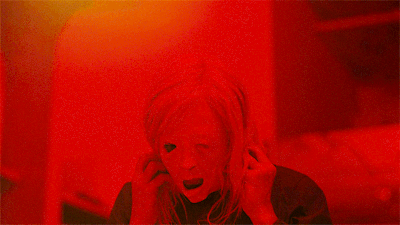In this week’s film Possessor and Futurama episode “I Second that Emotion”, we can see how empathy is an aspect of cognitive science, and plays a role within the relationship between body and mind. In one of the scenes from Futurama, Leela is at the bar crying about missing Nibbler, but we also see Bender at home on the couch with Fry crying as well (10:19). The cross-cutting technique is used here to show that these two events are happening at the same time, and that both Leela and Bender are experiencing the same emotion. The emotion is “traveling” from Leela to Bender through empathy, just as the camera has switched from Leela to Bender. Theory of Mind is explored in this scene, as earlier in the episode Bender receives a special empathy chip in his head that is in tune with Leela’s emotions. He is able to recognize that he is crying because he is feeling the sadness that Leela feels. When Fry questions if Bender misses Nibbler, Bender replies saying “Hell no. Its Leela’s stupid feelings”.

In the lecture it mentioned that Theory of Mind is “understanding that other people’s perspectives and thoughts are different from one’s own”, which is demonstrated by Bender admitting that the emotions he is feeling are not his own, and he is able to differentiate between the two. But, further into the scene, Bender feels the emotion of jealousy and starts going off on Fry saying things that Leela is feeling while she is in the bar. The lines between the two merge in that moment, showing how the body is necessary for the context of a situation and the emotions that are being felt in them.
I found it interesting that Bender is a robot, and in lacking a human body he seems to be the only one in the group who is not empathetic towards Leela’s situation. This episode highlighted how important empathy is in relationships and social settings. Connecting with others on deeper levels involves being emotionally mature and in tune to your environment. In a scene earlier in the episode, right after Bender has the empathy chip placed inside of him, the Professor is flipping through the different frequencies in the room (9:13). He experiences everyone’s emotions in a short span of time before finally getting to Leela, and even when he is experiencing her emotions for an extended period of time, there still is an emotional disconnect. He is fighting and complaining about the connection to Leela that he now shares. Although empathy is being shown as something that can be “placed” into someone’s brain, I think it requires the person themselves to want it themselves, as it is something that cannot be forced. His robotic body was not a factor experiencing empathy, but the chip placed inside his head was the main focal point. I think that maybe the show was trying to comment on how the mind and body actually work together when it comes to empathy.

In the film Possessor, assassin Taysa Vos jumps into the bodies of others in order to complete her assignments. In preparation of entering someone else’s body, Vos studies their behavior and vocal patterns in order to get into character. During one scene we see Vos watching footage of Colin Nate (the man she will be going into), and his girlfriend Ava (22:38). Vos repeats the words and phrases that Colin says, using different inflections to try and match his speech pattern. She takes notes of how he reacts in conversation as well as body language. She is trying to become Colin before even entering his body. This could be related back to simulation theory and how Vos is trying to get inside the headspace of Colin, so that she will be ready for different scenarios and interactions that may occur. If she can get an idea of what he is feeling and thinking about, it will be easier for her to replicate it in his body. It’s not just about going into their body as yourself, but changing yourself to fit their body. I think that’s where it becomes foggy for our main character as she slowly loses herself while being trapped inside of Colin’s body, while he fights for dominance over his mind. The empathy and emotion she is feeling can no longer be distinguished as her own because it is merging with the host.
The two scenes that really demonstrated the fragility of empathy were when Vos is being interviewed by Girder after coming out of someone’s mind. We see Vos examining some of her old belongings and identifying the significance of each one (8:38). In the beginning scene, Vos seems more aware and present while talking about the history of the specific items. She shows a sort of an emotional attachment to them, whereas in the ending scene she is shown more cold and robotic while shuffling through the case. I think this was meant to show how the time spent away from her body actually affected the way she was able to process emotions, especially because her mind was in a body that was not her own. Vos was able to feel what her host was feeling as the mission went haywire, and was no longer in control of how she was processing the events around herself. In the end it was as though Vos didn’t have any emotions of her own because she became so entangled with other peoples over the course of time.
7 thoughts on “To Feel, or Not To Feel”
Hi Sarah! I think it was very observational of you to mention the cross-cutting technique used in Futurama. The technique helps show us, the viewers, how Leela’s feelings transfer to Bender’s feelings and his environment. With the idea of the body being a necessary part of context and emotion, I think it’s safe to say Futurama reveals ideas about embodied cognition. Leela’s emotions between herself and Bender change contexts due to their bodies and their environment. I definitely noticed an emotional disconnect with Bender as well even when there was the empathy chip. As you put it, it can’t be forced. Empathy is something extremely human that exists in us by nature, not by machine.
I also looked at the scene when Vos observes Colin. I can see how it might connect to the simulation theory, however, I looked at it more as Vos mimicking Colin rather than getting into his headspace. If she was able to get into the headspace and feel what her victims feel, then I don’t think she’d be able to handle the job, but that’s just my take.
With the objects, the butterfly was definitely the most noticeably different. In the beginning, she mentions feeling bad for killing it. At the end, she just says she killed and mounted it. It’s such an interesting juxtaposition!
Sara Giarnieri
Hi Sara,
Really great observation about the ending of the film! What do you think that the juxtaposition between these two debriefing scenes means? How might it relate to the idea of empathy that we are exploring this week?
Jessica Hautsch
Hi Sarah,
In your analysis of Futurama, you make a really interesting observation: we and Bender know that he is sad (and experiencing Leela’s emotions because he is crying. This brings up an important point about the role that our bodies play in how we understand our emotions—as well as the emotions of others. This is something that we will return to in two weeks when we dive into emotions. It also begs the question: What does it mean for a robot to cry? This is connected to your observation about how Bender, who has a mechanical body, seems to be the only member of the group not to feel empathy.
Also, great job of discussing how Theory of Mind connects to the episode. As you note, Bender recognizes that his feelings (particularly about Nibbler) are not the same as all of the other characters (who adore that lil cutie). This also relates to what I was talking about in the VoiceThread about our primordial vs. nonprimordial experience of emotion. It is a bit of a complicated idea, but basically, at the beginning of the episode, Bender experiences primordial jealousy of Nibbler. The jealousy is originating from his “I.” Later, when he feels Leela’s jealous, he recognizes that it is nonprimordial. That jealousy is not originating from him, instead, he is empathetically feeling Leela’s jealousy.
Also, love your discussion of how Vos imitates the movements, gestures, and speech patterns of the people she is possessing. I would say, though, that this is not about simulating Colin, but about using her body to sense-into and live through his—even before she possesses him. What do you make of the fact that we also see her doing this for herself at the beginning of the film?
Jessica Hautsch
I think that it might be highlighting the fact that Vos really doesn’t have a sense of identity for even herself. After going into other people’s bodies and playing different roles, she forgets how to be herself when a performance is not involved. But we could also argue that it is still a performance, one for her husband and son. It makes me think about how people have different versions of themselves depending on who they are around, and eventually they may loss track of themselves.
Sarah Murphy
Hi Sarah,
Yes! I think you’re right about this. Later, when we talk about memory, we’ll discuss what is referred to as our “autobiographical selves.” The conceptualization of ourselves that we construct through our memories and experiences. Your comment has me thinking about how we see Vos literally constructing herself here!
Jessica Hautsch
Hi Sarah!
Loved your analysis on Possessor, the intricate way Vos studies and adapts to the body she is set to inherit is quite astounding, and you made an excellent comparison to how Vos replicates Colin’s mannerisms and inflections is a form of empathy in a way, a twisted way but a way indeed. Its as if she is twisting both embodied theory and embodied cognition. She is both reading what he is expressing through his actions to copy how he would behave while also actually physically “living through him,” it’s quite an interesting take on empathy itself and how it can actually be twisted and gnarled to the point of incomprehension. But hey, as depressing as it was it’ll still never reach the same level as the movie 7, damn that one hit different. Anyway, great job as always, can’t wait to see your analysis next week, apparently, we’re watching a tear-jerker so look out! 🙂
snaraujo
Hi Steph,
Yes! Love your observation about the various forms that embodied cognition and “living through” the body of the other take in this film.
And, I’m not sure that I’d call Arrival a tearjerker, but it has made me cry every time I’ve watched it. To be fair, it doesn’t take much for a piece of media to make me cry, so ymmv.
Jessica Hautsch